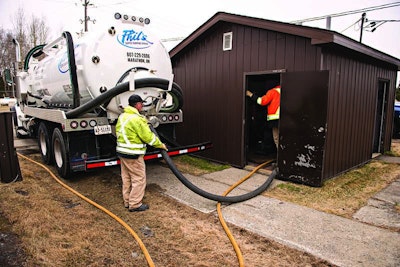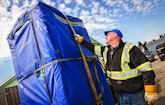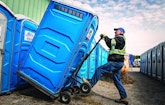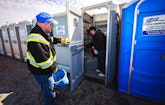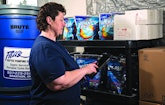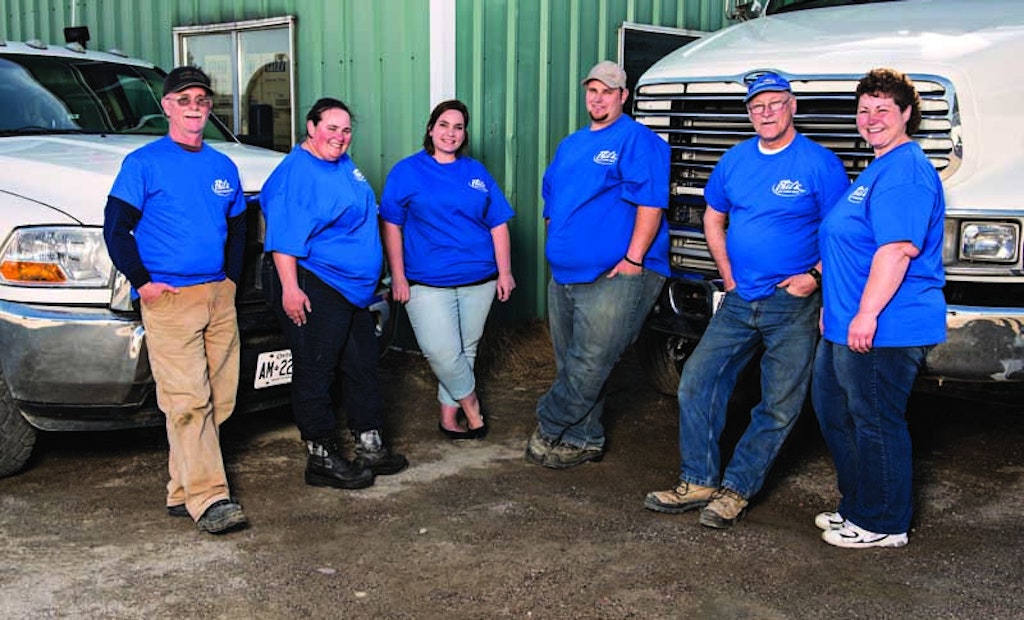
Interested in Industrial?
Get Industrial articles, news and videos right in your inbox! Sign up now.
Industrial + Get AlertsPhil’s Septic Pumping Service was founded in 1995 in the small community of Marathon, Ontario, Canada, on the North Shore of Lake Superior. Over two decades, the thriving town has moved from an economy based on pulp and paper to one more heavily supported by gold mining. A second generation of owners has evolved Phil’s Pumping by improving service and adding offerings more closely attuned to the new local economy and a population more interested in catered events.
Phil’s is owned by Ashley and Lee Riendeau — her parents Phil and Linda founded the company in 1995.
“My father was working in a local pulp and paper mill, and decided that a septic pumping business would provide him with a good retirement project,” says Ashley Riendeau. “He started it while working full time, but within two years he quit his job at the mill and worked septic pumping full time.”
Her mother worked the office, handling the books and scheduling. Riendeau often pitched in on both the office and service sides. Within a few years, the company took on a small number of portable restrooms and a full-time employee. Lee Riendeau also worked as a driver for the company, but left for a better paying career at one of the area gold mines.
Ashley’s father died in 2010, and her mother continued to operate the business for about a year.
CONTINUING A LEGACY
“She was tired of running it on her own, and wanted to retire,” says Riendeau. “She put the business up for sale, but there were no takers. We knew the business had a lot of potential, and didn’t want to see it shut down. My dad had a lot of pride in the business, and we wanted to continue it in his honor, so we decided to purchase it ourselves.”
Riendeau and her husband were in their mid-20s, having only recently completed school. Financing the purchase proved more challenging than they’d thought. The business assets included 40 restrooms and two vacuum trucks, but the local bank passed on a loan. The couple eventually found a friendly lender in Thunder Bay, a four-hour drive from Marathon. However, before the Riendeaus assumed ownership of the business, the only driver resigned.
“When we took over, we realized that we had to act immediately to stabilize the business,” says Riendeau. “We looked at all of the equipment and scrapped a ‘94 International outright. We replaced the tank, pumping system and hoses on a 2000 Kenworth T300.” They outfitted the rig with a 2,750-gallon steel tank built by Vacutrux and a Wallenstein pump.
Riendeau hired another full-time driver, while her husband continued to handle driving and performing truck maintenance on days off and weekends.
“I started sending out newsletters to keep our existing customers in the loop,” says Riendeau. “We wanted them to know better things were coming, including new equipment and services. We also began to more aggressively go after industrial wastewater contracts at gold mines and pulp mills, and long-term construction contracts for major infrastructure.”
The company designed a new logo and switched to Phil’s-branded reflective jackets, T-shirts and baseball caps to help reinforce the company image. All equipment and shop signage were also re-decaled.
EXPANDING IN EVENTS
“I think our service improved almost out of the gate,” says Riendeau. “My parents never serviced many events, but people seemed to notice the cleaner restrooms on job sites and we began to book more and more events. We were getting a lot of compliments and even the drivers were complimented for being professional and friendly.”
Business quickly expanded to the point where Phil’s required a second full-time driver in 2014. “We also hired a bookkeeper to come in twice a month to do major accounting, while I handle invoicing, calls and scheduling,” says Riendeau. “Our scheduling procedure is pretty simple, using an iPhone app and Google Maps.”
Today, the company covers an area about 125 miles east and west of Marathon between Wawa and Nipigon, mostly in a narrow band along the TransCanada Highway.
Phil’s currently offers 100 PJN3 portables, 10 Fleet models, and two wheelchair-accessible models all from PolyJohn Canada. Two single self-contained washroom units were supplied by Room to Go, and a double self-contained washroom trailer was purchased from Vacutrux Limited. The company also offers PolyJohn hand-wash sinks.
Four trucks make up the service fleet: the original 2000 Kenworth T300; a 2007 Sterling with 3,850-gallon steel tank built by SchellVac Equipment with a Fruitland pump; a 2011 Dodge Ram 3500 with separate 240-gallon steel waste tank (built in-house) and 210-gallon plastic freshwater tank, with a Wallenstein pump; and a 2003 GMC Sierra 2500 with 180-gallon waste/90-gallon freshwater tank (PickupTanx) and Wallenstein pump. The trucks also haul a 1,200-gallon ABI Attachments plastic water tank on a steel trailer by Absolute Innovations Inc.
Transport trailers are from McKee Technologies and Advantage Trailer & Hitches. The company also uses a Mini Metro Mover from Allied Forward Motion.
Deodorizers are provided by Walex Products Company.
Phil’s also offers a Spartan 727 mini-jetter/locator and a SeeSnake video inspection camera by RIDGID.
PUMPING IS MAINSTAY
New industrial work is helping to expand the business.
“There are a lot of exciting things happening around the area from a business perspective,” says Riendeau. “We recently picked up a big hydro dam construction contract about 45 miles away, which involves setting up and servicing 20 portable restrooms for probably three to four years. They don’t have water service yet, so we’re also delivering potable and non-potable water to them using our water delivery trailer.”
Gold mine operations and construction also provide a steady source of portable restroom contracts. Summer festivals, such as the Terrace Bay Street Festival, typically call for 15 restroom units, while smaller events such as weddings call for three to four.
While the new services are expanding revenue, Phil’s still relies on pumping for 70 percent of its business.
With a population of about 4,000, Marathon is the hub of the North Shore of Lake Superior and is served by municipal sewers. However, a series of smaller towns and cottages stretched out along the service area require septic pumping services. The company also has large industrial pumping contracts with pulp and paper mills and local gold mines.
“With the pulp and paper mills in Terrace Bay and White River we pump nontoxic sludge from their cleaning tanks,” says Riendeau. “Many of these tanks also form a layer of mud in the bottom that we pump out. The gold mines have emergency containment ponds for industrial wastewater and they eventually fill with rain. We’re contracted to pump the rainwater out of them to keep them empty in case of an emergency.”
Wherever possible, Phil’s likes to piggyback residential septic work on the back of regularly scheduled industrial work, allowing drivers to maximize efficiency. Following septic tank pumping, operators promote the use of Bio-Active septic tank treatment from Walex.
Phil’s also maintains septic pumping contracts with several area native tribal reserves, including Pic Mobert First Nation, Pic River First Nation and Pays Plat First Nation.
“We like the efficiency of these contracts,” says Riendeau. “Even if we receive a call from one of the residents, the billing is handled through each reserve’s Band Council.”
The company also works on contracts for provincial parks in the area, pumping out large septic vaults for permanent outhouses.
The Spartan mini-jetter gets a workout on clogged drains and piping around septic fields. “We advertise the jetter as a method of preventive maintenance, so people don’t have to worry about a serious blockage down the road,” says Riendeau.
WEATHER A CHALLENGE
Snow and cold weather remain a local challenge. While the TransCanada Highway is well maintained, a snowstorm can sideline service trucks for the day. While they don’t carry brine, salt is added to the portable restroom holding tank water on placement to foil frigid temperatures. Insulated covers from Pro Stitch help to keep the units comfortable.
The company keeps in touch with the industry as a member of the Ontario Association of Sewage Industry Services (OASIS). The owners also attended their first Water & Wastewater Equipment, Treatment & Transport Show in 2015.
“It was overwhelming,” says Riendeau. “It took us two days to see everything, and it was really good for the business. We bought our water trailer and jetter/locator at the show. These were services we never really considered before the show but they’ve been very successful and have brought in a lot of additional income since. We also got to meet a lot of our suppliers face to face. I feel that getting to know them has gotten us better service — and better deals.”
Riendeau makes frequent sales calls to local businesses and events. She often sends out unsolicited quotes to events she’d like to take on. “I’m not trying to win these events by being the cheapest,” she says. “I just send a quote at a price that we would be comfortable delivering.”
Phil’s continues to promote itself through multiple outlets — its website, Facebook, distribution of flyers and local newspaper advertising. The company also appears at local events, such as home shows.
“A lot of our promotion comes from sponsoring events and causes,” says Riendeau. “We are very involved in the community and volunteer where we can. We often donate extra portable restrooms at events, and we are major sponsors of a local minor hockey team, the Marathon Mercs. People see us out in the community doing these things, or when it’s covered in the newspaper, so it’s a great way to promote the business while helping out our community.”
MOST IMPROVED BUSINESS
The community has taken notice. The company won the Marathon and District Chamber of Commerce “Most Improved Business” award in 2014, as nominated by the public.
Better still, company revenue is climbing, growing more than 400 percent since the couple purchased the company.
“When we bought the business originally, we were a bit skeptical about how we’d like running it, but I’m enjoying it far more than I ever thought I would,” says Riendeau. “Managing the business to grow and thrive is definitely rewarding.”
Provincial regulations boost trailer rentals
Phil’s Septic Pumping Service of Marathon, Ontario, Canada, has taken a leap into restroom trailers, driven as much by the need for a better class of restrooms at weddings and VIP events as provincial labor laws regarding construction restrooms.
The company currently offers three trailers: two singles supplied by Room to Go and a double from Vacutrux Limited.
“We’re getting solid bookings on events with the double trailer,” says company co-owner Ashley Riendeau. “But the real drive to get into trailers followed the Ontario Ministry of Labour’s regulations requiring heated washrooms with warm running water and flush toilets for construction sites in winter. We bought the two singles because we wanted to supply the market before our clients decided to get them from somewhere else.”
While the law is the law, Riendeau notes that ministry inspectors don’t seem to be enforcing the regulations, particularly in more sparsely populated areas. That’s slowing an increase in demand for the full-service construction trailers.
“Still, we’re solidly booked with the trailers we do have,” she says. “We definitely want more trailers in the near future — it seems to be the way the market is going.”
